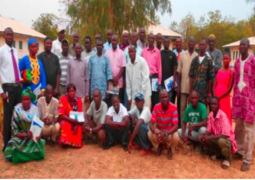The world met in Paris in November and December 2015 to address the issue of global warming which concluded with a landmark Paris agreement that sought to bring temperatures below 20 C.
COP 21 further required each and every country to make proposals as to how to address climate change individually.
The Gambia, as a member of the global community and currently facing the effects of global warming, equally proposed it intentions to reduce overall emissions by about 44.4% in 2025 and 45.4% in 2030.
The country also proposed measures for mitigation and adoption.
The policy dialogue therefore seeks to examine the country’s current status in terms of policy decisions and actions, and the role and contribution required of both state and non-state actors in the fight against climate change.
Speaking at the ceremony held at Tango hall in Fajara, Bubacarr Zaidi Jallow, principal climate change officer of the Ministry of Environment, in his keynote address, said the threat of global warming is so grave “it has the potential of destroying our civilization”.
He noted that the effects of climate change are already apparent with increased incidence of floods, storms, droughts, water shortage and rising sea levels.
He said the phenomenon that is expected to grow will be severe over the course of the century, which is likely to hit the world’s poorest the hardest.
He said further that the collapse of the Greenland ice sheet and the disruption of the Gulf Stream Ocean current “are two very real threats that could cause mayhem”, and “the arctic may become entirely free of sea ice within 3-4 decades”.
These activities have increased the amount of greenhouse gases in the atmosphere, especially carbon dioxide, methane, and nitrous oxide, he said, adding that industry, power, transport, buildings, construction and deforestation “are the main polluters and culprits”.
“However if we manage our environment in a responsible way, by harnessing renewable energy, we will not only live in a cleaner planet but the net results in terms of profits will be in over hundreds of billions of dollars,”he said.
He also said the implementation of renewable energy is easy, realistic and affordable as an alternative to replacing nuclear and fossil fuels (coal, oil, gas).
“The opportunities for business growth are huge leading to strong foundations of a stable economy,” he added.
“The quicker we change to renewable energy sources, the sooner we will be saving our precious and beautiful planet whilst the other benefit of doing so is that, renewable energies not only lead us to climate change solutions and sustainable development, but create boundless opportunities for profit and wealth in a responsible way.”
For his part, Ousman Yabo, executive Director of TANGO, said the serieson climate change effects being undertaken, is going to address a very important global issue.
“There were over hundred states present in Paris to discuss the issues,” he said, adding that climate change is a global challenge.


